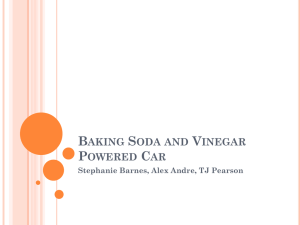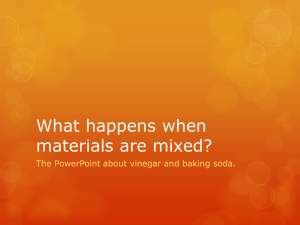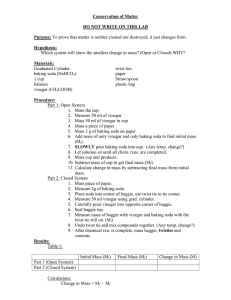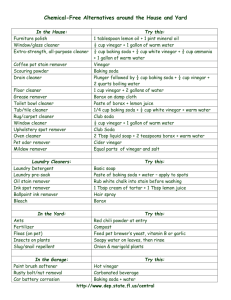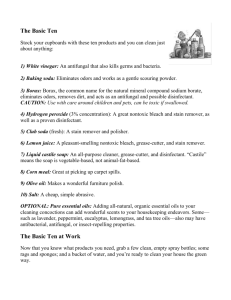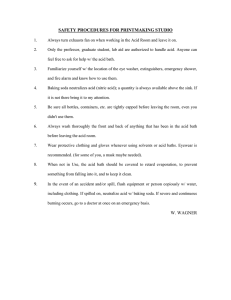Safe Alternatives to Common Household Products
advertisement
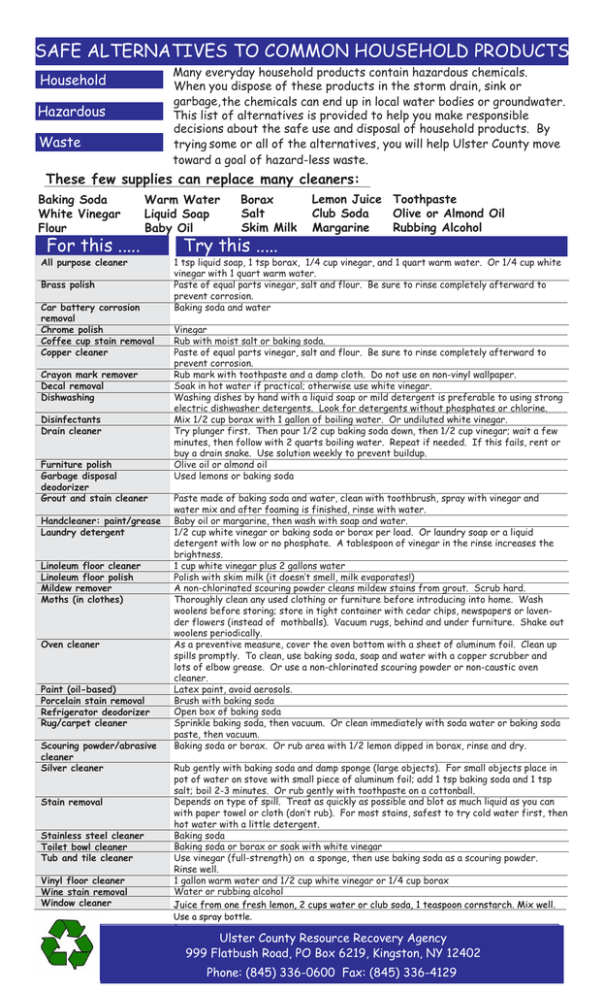
SAFE ALTERNATIVES TO COMMON HOUSEHOLD PRODUCTS Many everyday household products contain hazardous chemicals. When you dispose of these products in the storm drain, sink or garbage,the chemicals can end up in local water bodies or groundwater. This list of alternatives is provided to help you make responsible decisions about the safe use and disposal of household products. By trying some or all of the alternatives, you will help Ulster County move toward a goal of hazard-less waste. Household Hazardous Waste These few supplies can replace many cleaners: Baking Soda White Vinegar Flour For this ..... Warm Water Liquid Soap Baby Oil All purpose cleaner Brass polish Car battery corrosion removal Chrome polish Coffee cup stain removal Copper cleaner Crayon mark remover Decal removal Dishwashing Disinfectants Drain cleaner Furniture polish Garbage disposal deodorizer Grout and stain cleaner Handcleaner: paint/grease Laundry detergent Linoleum floor cleaner Linoleum floor polish Mildew remover Moths (in clothes) Oven cleaner Paint (oil-based) Porcelain stain removal Refrigerator deodorizer Rug/carpet cleaner Scouring powder/abrasive cleaner Silver cleaner Stain removal Stainless steel cleaner Toilet bowl cleaner Tub and tile cleaner Vinyl floor cleaner Wine stain removal Window cleaner Borax Salt Skim Milk Try this ..... Lemon Juice Toothpaste Olive or Almond Oil Club Soda Rubbing Alcohol Margarine 1 tsp liquid soap, 1 tsp borax, 1/4 cup vinegar, and 1 quart warm water. Or 1/4 cup white vinegar with 1 quart warm water. Paste of equal parts vinegar, salt and flour. Be sure to rinse completely afterward to prevent corrosion. Baking soda and water Vinegar Rub with moist salt or baking soda. Paste of equal parts vinegar, salt and flour. Be sure to rinse completely afterward to prevent corrosion. Rub mark with toothpaste and a damp cloth. Do not use on non-vinyl wallpaper. Soak in hot water if practical; otherwise use white vinegar. Washing dishes by hand with a liquid soap or mild detergent is preferable to using strong electric dishwasher detergents. Look for detergents without phosphates or chlorine. Mix 1/2 cup borax with 1 gallon of boiling water. Or undiluted white vinegar. Try plunger first. Then pour 1/2 cup baking soda down, then 1/2 cup vinegar; wait a few minutes, then follow with 2 quarts boiling water. Repeat if needed. If this fails, rent or buy a drain snake. Use solution weekly to prevent buildup. Olive oil or almond oil Used lemons or baking soda Paste made of baking soda and water, clean with toothbrush, spray with vinegar and water mix and after foaming is finished, rinse with water. Baby oil or margarine, then wash with soap and water. 1/2 cup white vinegar or baking soda or borax per load. Or laundry soap or a liquid detergent with low or no phosphate. A tablespoon of vinegar in the rinse increases the brightness. 1 cup white vinegar plus 2 gallons water Polish with skim milk (it doesn‛t smell, milk evaporates!) A non-chlorinated scouring powder cleans mildew stains from grout. Scrub hard. Thoroughly clean any used clothing or furniture before introducing into home. Wash woolens before storing; store in tight container with cedar chips, newspapers or lavender flowers (instead of mothballs). Vacuum rugs, behind and under furniture. Shake out woolens periodically. As a preventive measure, cover the oven bottom with a sheet of aluminum foil. Clean up spills promptly. To clean, use baking soda, soap and water with a copper scrubber and lots of elbow grease. Or use a non-chlorinated scouring powder or non-caustic oven cleaner. Latex paint, avoid aerosols. Brush with baking soda Open box of baking soda Sprinkle baking soda, then vacuum. Or clean immediately with soda water or baking soda paste, then vacuum. Baking soda or borax. Or rub area with 1/2 lemon dipped in borax, rinse and dry. Rub gently with baking soda and damp sponge (large objects). For small objects place in pot of water on stove with small piece of aluminum foil; add 1 tsp baking soda and 1 tsp salt; boil 2-3 minutes. Or rub gently with toothpaste on a cottonball. Depends on type of spill. Treat as quickly as possible and blot as much liquid as you can with paper towel or cloth (don‛t rub). For most stains, safest to try cold water first, then hot water with a little detergent. Baking soda Baking soda or borax or soak with white vinegar Use vinegar (full-strength) on a sponge, then use baking soda as a scouring powder. Rinse well. 1 gallon warm water and 1/2 cup white vinegar or 1/4 cup borax Water or rubbing alcohol Juice from one fresh lemon, 2 cups water or club soda, 1 teaspoon cornstarch. Mix well. Use a spray bottle. 1 teaspoon Ulster County Resource Recovery Agency 999 Flatbush Road, PO Box 6219, Kingston, NY 12402 Mix all ingredients and pour into plastic spray bottle. Shake well. Phone: (845) 336-0600 Fax: (845) 336-4129
